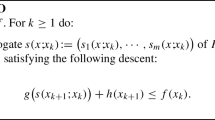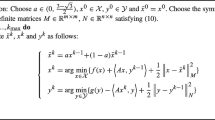Abstract
In this paper we consider the difference-of-convex (DC) programming problems, whose objective function is the difference of two convex functions. The classical DC Algorithm (DCA) is well-known for solving this kind of problems, which generally returns a critical point. Recently, an inertial DC algorithm (InDCA) equipped with heavy-ball inertial-force procedure was proposed in de Oliveira et al. (Set-Valued Variat Anal 27(4):895–919, 2019), which potentially helps to improve both the convergence speed and the solution quality. Based on InDCA, we propose a refined inertial DC algorithm (RInDCA) equipped with enlarged inertial step-size compared with InDCA. Empirically, larger step-size accelerates the convergence. We demonstrate the subsequential convergence of our refined version to a critical point. the Kurdyka-Łojasiewicz (KL) property of the objective function, we establish the sequential convergence of RInDCA. Numerical simulations on checking copositivity of matrices and image denoising problem show the benefit of larger step-size.




Similar content being viewed by others
Notes
Let \(\mu >0\) and \(i=0,1\), \({}^{\mu }f_i\) is the Moreau envelope of \(f_i\) with parameter \(\mu \), defined as \({}^{\mu } f_i(\mathbf{x }):= \min \{f_i(\mathbf{y })+\frac{1}{2{\mu }}\Vert \mathbf{x }-\mathbf{y } \Vert ^2:\mathbf{y }\in \mathbb {R}^n\}.\)
\(\Vert \mathbf{A }\Vert \) is the spectral norm of \(\mathbf{A }\).
References
Adly S, Attouch H, Le HM (2021) First order inertial optimization algorithms with threshold effects associated with dry friction. hal:03284220
Aleksandrov AD (2012) On the surfaces representable as difference of convex functions. Sib Elektron Mat Izvest 9:360–376
Artacho FJA, Campoy R, Vuong PT (2019) The boosted dc algorithm for linearly constrained dc programming. arXiv:1908.01138
Artacho FJA, Fleming RM, Vuong PT (2018) Accelerating the dc algorithm for smooth functions. Math Programm 169(1):95–118
Artacho FJA, Vuong PT (2020) The boosted dc algorithm for nonsmooth functions. SIAM J Optim 30(1):980–1006
Attouch H, Bolte J (2009) On the convergence of the proximal algorithm for nonsmooth functions involving analytic features. Math Programm 116(1):5–16
Attouch H, Bolte J, Svaiter BF (2013) Convergence of descent methods for semi-algebraic and tame problems: proximal algorithms, forward-backward splitting, and regularized gauss-seidel methods. Math Programm 137(1):91–129
Beck A (2017) First-order methods in optimization. SIAM
Beck A, Teboulle M (2009) Fast gradient-based algorithms for constrained total variation image denoising and deblurring problems. IEEE Trans Image Process 18(11):2419–2434
Bolte J, Daniilidis A, Lewis A (2007) The łojasiewicz inequality for nonsmooth subanalytic functions with applications to subgradient dynamical systems. SIAM J Optim 17(4):1205–1223
Bolte J, Sabach S, Teboulle M (2014) Proximal alternating linearized minimization for nonconvex and nonsmooth problems. Math Programm 146(1):459–494
de Oliveira W (2020) The abc of dc programming. Set-Valued Variat Anal 28(4):679–706
de Oliveira W, Tcheou MP (2019) An inertial algorithm for dc programming. Set-Valued Variat Anal 27(4):895–919
Dür M, Hiriart-Urruty JB (2013) Testing copositivity with the help of difference-of-convex optimization. Math Program 140(1 Ser B):31–43
Hartman P (1959) On functions representable as a difference of convex functions. Pac J Math 9(3):707–713
Hiriart-Urruty JB (1985) Generalized differentiability/duality and optimization for problems dealing with differences of convex functions. In: Ponstein J (ed) Convexity and duality in optimization. Springer, Berlin, pp 37–70
Horst R, Thoai NV (1999) Dc programming: overview. J Optim Theory Appl 103:1–43
Joki K, Bagirov AM, Karmitsa N, Mäkelä MM (2017) A proximal bundle method for nonsmooth dc optimization utilizing nonconvex cutting planes. J Glob Optim 68(3):501–535
Le Thi HA, Pham DT (2005) The dc (difference of convex functions) programming and dca revisited with dc models of real world nonconvex optimization problems. Ann Oper Res 133(1–4):23–46
Le Thi HA, Pham DT (2018) Dc programming and dca: thirty years of developments. Math Programm 169(1):5–68
Le Thi HA, Pham DT, Ngai HV (2012) Exact penalty and error bounds in dc programming. J Glob Optim 52:509–535
Liu T, Pong TK, Takeda A (2019) A refined convergence analysis of \({{\rm pDCA}}_e\) ith applications to simultaneous sparse recovery and outlier detection. Comput Optim Appl 73(1):69–100
Lu Z, Zhou Z, Sun Z (2019) Enhanced proximal dc algorithms with extrapolation for a class of structured nonsmooth dc minimization. Math Programm 176(1):369–401
Monga V (2017) Handbook of convex optimization methods in imaging science, vol 1. Springer, Berlin
Mukkamala MC, Ochs P, Pock T, Sabach S (2020) Convex-concave backtracking for inertial Bregman proximal gradient algorithms in nonconvex optimization. SIAM J Math Data Sci 2(3):658–682
Nesterov YE (1983) A method for solving the convex programming problem with convergence rate \(\cal{O}(1/{k^2})\). In: Dokl. akad. nauk Sssr, vol. 269, pp. 543–547
Nesterov YE (2013) Gradient methods for minimizing composite functions. Math Programm 140(1):125–161
Niu YS, Wang YJ (2019) Higher-order moment portfolio optimization via the difference-of-convex programming and sums-of-squares. arXiv:1906.01509
Ochs P, Chen Y, Brox T, Pock T (2014) ipiano: inertial proximal algorithm for nonconvex optimization. SIAM J Imaging Sci 7(2):1388–1419
Pang JS, Razaviyayn M, Alvarado A (2017) Computing b-stationary points of nonsmooth dc programs. Math Oper Res 42(1):95–118
Pham DT, Huynh VN, Le Thi HA, Ho VT (2021) Alternating dc algorithm for partial dc programming problems. J Glob Optim. https://doi.org/10.1007/s10898-021-01043-w
Pham DT, Le Thi HA (1997) Convex analysis approach to d.c. programming: theory, algorithms and applications. Acta Math Vietnam 22(1):289–355
Pham DT, Le Thi HA (1998) A dc optimization algorithm for solving the trust-region subproblem. SIAM J Optim 8(2):476–505
Pham DT, Le Thi HA (2014) Recent advances in DC programming and DCA. Transactions on Computational Intelligence XIII, pp 1–37
Pham DT, Souad EB (1986) Algorithms for solving a class of nonconvex optimization problems methods of subgradients. In: Hiriart-Urruty J-B (ed) Fermat days 85: mathematics for optimization, vol 129. Elsevier, New York, pp 249–271
Phan D.N, Le H.M, Le Thi H.A (2018) Accelerated difference of convex functions algorithm and its application to sparse binary logistic regression. In: IJCAI, pp. 1369–1375
Pock T, Sabach S (2016) Inertial proximal alternating linearized minimization (ipalm) for nonconvex and nonsmooth problems. SIAM J Imaging Sci 9(4):1756–1787
Polyak BT (1987) Introduction to optimization, vol 1. Optimization Software Inc., New York
Rockafellar RT (1970) Convex analysis, vol 36. Princeton University Press, Princeton
Souza JCO, Oliveira PR, Soubeyran A (2016) Global convergence of a proximal linearized algorithm for difference of convex functions. Optim Lett 10(7):1529–1539
Wen B, Chen X, Pong TK (2018) A proximal difference-of-convex algorithm with extrapolation. Comput Optim Appl 69(2):297–324
Zavriev S, Kostyuk F (1993) Heavy-ball method in nonconvex optimization problems. Comput Math Model 4(4):336–341
Acknowledgements
This work is supported by the National Natural Science Foundation of China (Grant 11601327). We thank the anonymous referees for their valuable remarks.
Author information
Authors and Affiliations
Corresponding author
Additional information
Publisher's Note
Springer Nature remains neutral with regard to jurisdictional claims in published maps and institutional affiliations.
This work is supported by the National Natural Science Foundation of China (Grant 11601327).
Rights and permissions
About this article
Cite this article
You, Y., Niu, YS. A refined inertial DC algorithm for DC programming. Optim Eng 24, 65–91 (2023). https://doi.org/10.1007/s11081-022-09716-5
Received:
Revised:
Accepted:
Published:
Issue Date:
DOI: https://doi.org/10.1007/s11081-022-09716-5
Keywords
- Difference-of-convex programming
- Refined inertial DC algorithm
- Kurdyka-Łojasiewicz property
- Checking copositivity of matrices
- Image denoising




